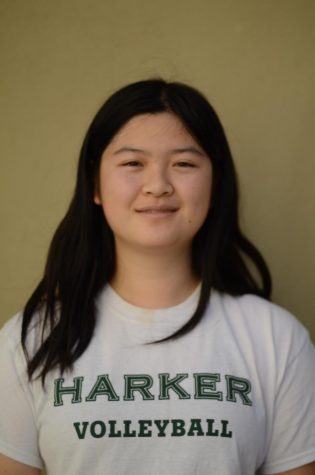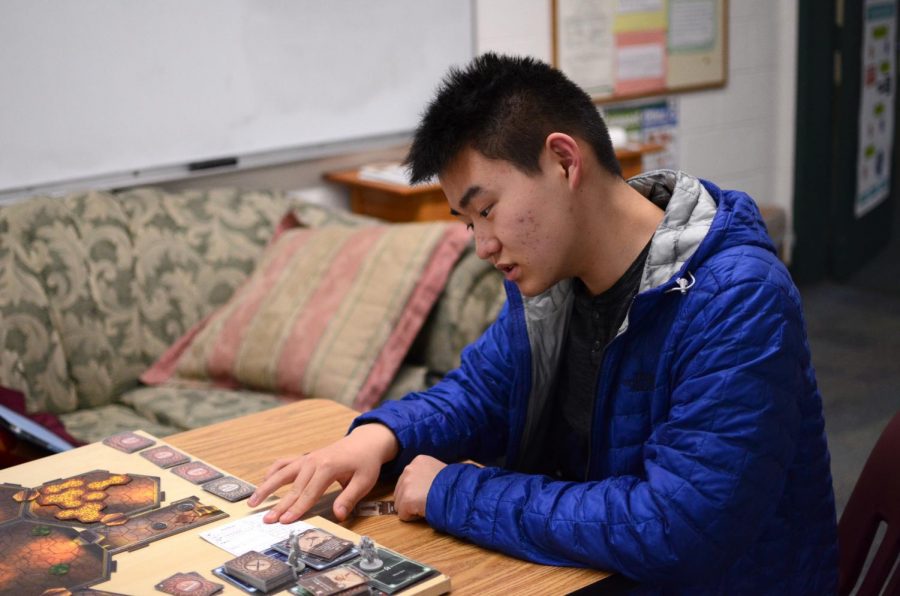Humans of Harker: Exploring boundaries
Jessie Wang (12) discovers his self-identity
“How would I identify a good person? Most probably someone who cares. I could throw out all the synonyms, all the vocab words, the ones like kind, benevolent, nice-hearted, but ultimately I think the essence of what I think a good person is just someone who cares,” Jessie Wang (12) said.
Embarking on a scenic hike along the trails at Sanborn County Park, Jessie Wang (12) stopped by a pond with frogs and lizards, watching 10-year-old kids enamored by the search for the little critters. Each time one was found, a group would form around it, oohing and aahing at the beauty of nature amidst the pouring rain.
Over Ski Break of his junior year, Jessie volunteered as a cabin leader at Walden West. Corralling a group of 18 fifth graders for a week in the wilderness, Jessie learned a lot about what it meant to be a leader. Especially when the power went out, when everyone was panicking, he had to be confident and serve as a role model.
“There’s this ancient Chinese legend about a carp: It swims up a waterfall, struggling on its way. Once it gets to the top, it jumps through a gate and becomes a dragon, soaring through the sky,” Jessie said. “Cabin leaders aren’t allowed to use their real names with the campers and you have to choose a nature name, so the name I chose was Carp. I think that that story of growth [in the Chinese legend] is really representative of what [I experienced] there. When I was acting as a cabin leader, I had to explore the boundaries: I want to be friendly, I want these kids to like me, but I also have to keep this sense that I’m in charge here.”
Going into the week, Jessie didn’t really know what to expect it. Besides receiving 100 volunteer hours and the fact that it sounded fun, he didn’t think he would gain anything personally; he didn’t except the lessons he learned from being relied on.
“In everyday life, there aren’t really those instances where you don’t have people to rely on, where you’re in isolation. And that’s how I felt as the week went on because I was the only cabin leader for our cabin; I learned a lot about independence,” he said. “As I’m going off to college next year, I have to do things myself. It helped me realize that throughout my life, I’ve always been relying on my parents; I’ve always been relying on other people. And when it came time for people to rely on me, it was time for me to step up and do so.”
Following his one-week run as a cabin leader, Jessie became a swim instructor for children age four to six at his local YMCA.
“Everything needs practice. I wasn’t good when I started, and I was taught a lot by my peers who were older swim instructors. Teaching the children, I’ve learned how to encourage, how to offer criticism constructively, how to plan and engage kids, [how to make definitive decisions],” Jessie said. “I felt the sense of accomplishment you get when you’ve taught someone something and they understood and completed it.”
That same feeling of satisfaction led Jessie to tutor a fifth grader to improve his essay writing skills.
“I noticed that when you teach you learn because I have to explain my thought processes to this kid and explained that this is how you should do something and I have to explain understandably,” he said. “It always feels good when someone your teaching says that they understand and shows that they understand. I found it really nice when the student said that he thought our sessions were valuable.”
Ever since Jessie joined Harker three years ago, he has been a part of the journalism program, which helped him find a supportive niche.
“Transferring to Harker in my sophomore year where people have known each other since Kindergarten with very established friend groups, I think it was really helpful for me to have journalism as a [community] because I was immediately included into this group,” he said.
“I immediately had this group of people I could rely on because we were connected through this mutual interest; I made some great friends from the program.”
As Senior Copy Editor in his senior year, Jessie strove to give back to the very community that provided him with a sense of reliance, accountability, and trust.
“Sometimes when it’s 7 p.m., we’re in the journalism room, and we were supposed to turn the paper three hours ago, I’m like, ‘Why did I choose to be a copy editor? I could have just been like a columnist or a reporter – I didn’t have to do anything,’” Jessie said. “Then, I remember that it’s an extra responsibility that I took on because I want to help and give back. Through my work, I think I’m making this community that I’ve learned a lot from better. And I’m happy about that.”
Jessie exudes passion for various of his curiosities, including Chinese culture.
“He’s very passionate about a lot of things, which is not really obvious when you first meet him. I think at first he’s a very quiet, withdrawn person,” Sana Pandey (12), a friend of Jessie’s, said. “[He’s passionate about] Chinese culture [and] tea. He’s so good at making tea.”
His pride for his cultural background is not unnoticed by Sofie Kassaras, one of Jessie’s friends.
“He talks a lot about his family and [about] Chinese culture, that’s like a big part of his identity. And he’s very proud of that,” friend Sofie Kassaras (12) said. “He’s super proud of showing his true self, even if a lot of cultures [are] washed out these days.”
Jessie’s interest in Chinese culture arose in recent years as he came to a realization that this was an integral part of his identity that he wanted to delve deeper into.
“This is my culture that my parents grew up, and I don’t really know much about it. I took Chinese classes throughout childhood and up till sophomore year when I took the AP Chinese test. But that’s really not much, is it?” Jessie said. “It’s my culture. It’s my family’s culture. It’s part of my journey to try and understand who I am.”
Despite initially seeming quiet, after English teacher Christopher Hurshman got to know Jessie, his deep enthusiasm for his interests shone through.
“[He is] a fascinatingly interesting person; he has a lot of unexpected passions and curiosities,” Hurshman said. “You discover that he is really interested in invented languages or in myth, and it’s not the sort of thing that he would necessarily disclose upon first meeting but something that emerges organically over time. I think he’s settled more and more into the person that he is, and he’s grown more okay with his particular interests and just seems more naturally himself.”
Through all his experiences, Jessie’s journey of self-discovery boils down to two questions that he constantly asks himself: Who am I, and why do I think this?
“As I’ve grown up, I’ve come to look at other people more. I’ve shifted away from just thinking about myself and looking at everything through my eyes. It’s helped me to realize that people are so different, that they haven’t had the same experiences,” he said. “And that led me to think, what are my experiences and how have I been raised and how am I different? Where is the difference in viewpoints coming from?”
For Jessie, it comes down to the ability to care.
“How would I identify a good person?” Jessie said. “Probably someone who cares. I could throw in all the synonyms, all the vocab words, the ones like kind, benevolent, nice-hearted. But ultimately, I think the essence of what I think a good person is just someone who cares.”
Additional reporting by Catherine Feng.

Catherine Feng (10) is the assistant copy editor for the Winged Post. This is her second year on staff, and she hopes to improve her journalistic skills...


















![“[Building nerf blasters] became this outlet of creativity for me that hasn't been matched by anything else. The process [of] making a build complete to your desire is such a painstakingly difficult process, but I've had to learn from [the skills needed from] soldering to proper painting. There's so many different options for everything, if you think about it, it exists. The best part is [that] if it doesn't exist, you can build it yourself," Ishaan Parate said.](https://harkeraquila.com/wp-content/uploads/2022/08/DSC_8149-900x604.jpg)




![“When I came into high school, I was ready to be a follower. But DECA was a game changer for me. It helped me overcome my fear of public speaking, and it's played such a major role in who I've become today. To be able to successfully lead a chapter of 150 students, an officer team and be one of the upperclassmen I once really admired is something I'm [really] proud of,” Anvitha Tummala ('21) said.](https://harkeraquila.com/wp-content/uploads/2021/07/Screen-Shot-2021-07-25-at-9.50.05-AM-900x594.png)







![“I think getting up in the morning and having a sense of purpose [is exciting]. I think without a certain amount of drive, life is kind of obsolete and mundane, and I think having that every single day is what makes each day unique and kind of makes life exciting,” Neymika Jain (12) said.](https://harkeraquila.com/wp-content/uploads/2017/06/Screen-Shot-2017-06-03-at-4.54.16-PM.png)








![“My slogan is ‘slow feet, don’t eat, and I’m hungry.’ You need to run fast to get where you are–you aren't going to get those championships if you aren't fast,” Angel Cervantes (12) said. “I want to do well in school on my tests and in track and win championships for my team. I live by that, [and] I can do that anywhere: in the classroom or on the field.”](https://harkeraquila.com/wp-content/uploads/2018/06/DSC5146-900x601.jpg)
![“[Volleyball has] taught me how to fall correctly, and another thing it taught is that you don’t have to be the best at something to be good at it. If you just hit the ball in a smart way, then it still scores points and you’re good at it. You could be a background player and still make a much bigger impact on the team than you would think,” Anya Gert (’20) said.](https://harkeraquila.com/wp-content/uploads/2020/06/AnnaGert_JinTuan_HoHPhotoEdited-600x900.jpeg)

![“I'm not nearly there yet, but [my confidence has] definitely been getting better since I was pretty shy and timid coming into Harker my freshman year. I know that there's a lot of people that are really confident in what they do, and I really admire them. Everyone's so driven and that has really pushed me to kind of try to find my own place in high school and be more confident,” Alyssa Huang (’20) said.](https://harkeraquila.com/wp-content/uploads/2020/06/AlyssaHuang_EmilyChen_HoHPhoto-900x749.jpeg)



